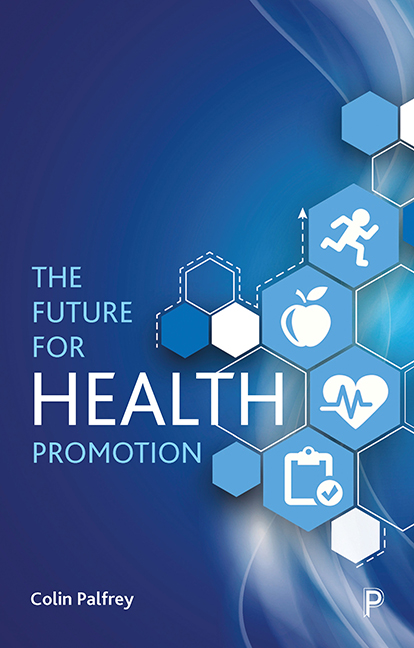Book contents
- Frontmatter
- Contents
- List of abbreviations
- Acknowledgements
- one Main themes
- two The origins of health promotion
- three Evidence base and methods for evaluation
- four Strategies for health promotion
- five Health economics and health promotion
- six Health promotion and mental health
- seven International perspectives
- eight The future for health promotion
- References
- Index
five - Health economics and health promotion
Published online by Cambridge University Press: 12 April 2022
- Frontmatter
- Contents
- List of abbreviations
- Acknowledgements
- one Main themes
- two The origins of health promotion
- three Evidence base and methods for evaluation
- four Strategies for health promotion
- five Health economics and health promotion
- six Health promotion and mental health
- seven International perspectives
- eight The future for health promotion
- References
- Index
Summary
Defining terms: economics and health economics
In an era in which there is huge pressure on the National Health Service (NHS) to meet increasing demand with decreasing resources, the role of economists is central. The volume of demand has been brought about mainly because of two factors: advancements in health technology and an ageing population. As noted in the previous chapter, unhealthy lifestyles are contributing to unwelcome health conditions such as coronary heart disease, certain cancers and type 2 diabetes. With pressure to increase the NHS budget to help deal with this increase in demand, there are also concerns about whether significant resources would actually provide an improvement in the quality and effectiveness of health services. One estimate, for example, claimed that up to 25% of all healthcare services may be unnecessary (Borowitz and Sheldon, 1993), while a more recent report warned that the NHS was wasting billions of pounds because of a severe lack of efficiency (ONS, 2004). These figures need to be and will be updated later in this chapter. They suggest that the prediction made soon after the inauguration of the NHS – that within a short space of time, demand on the NHS would stabilise – has proved to be wildly optimistic.
In a speech to the House of Commons, Aneurin Bevan (1949) made this statement concerning initial anxieties about the ability of the NHS to respond to an unexpected demand for dental services and free spectacles: ‘When the first rush was over the demand would even out. And so it proved. Indeed, it was proved even beyond the expectations of those of us who had most faith in the Service’. However, in a speech to the House of Commons six years earlier, Bevan had to convince opposition members of parliament to agree a supplementary estimate to the budget to increase the remuneration of student nurses. This demand, he asserted, had nothing to do with the result of any maladministration or excessive bureaucracy. Then, as now, politicians and health professionals ‘have a duty to establish not only that they are doing good, but that they are doing more good than anything else that could be done with the same resources’ (Williams, 1993).
- Type
- Chapter
- Information
- The Future for Health Promotion , pp. 113 - 140Publisher: Bristol University PressPrint publication year: 2018



